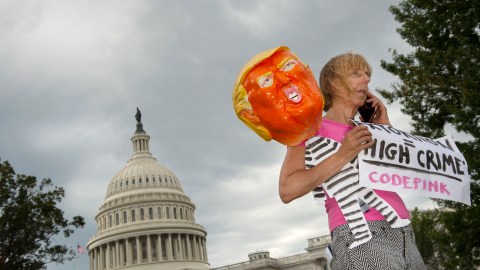Millions of Americans have had suicidal thoughts because of politics, Nebraska researchers say

Caroline Brehman / Getty
- The study, published in PLOS One, is based on a YouGov survey of 800 Americans.
- The results showed that, because of politics, approximately: 4 percent had considered suicide and about 20 percent have had friendships damaged.
- The researchers said it’s important to better understand how politics are affecting our mental, physical, and social health.
Many Americans say following politics is causing them to lose sleep, friends and peace of mind, with a small share even reporting suicidal thoughts, according to new research.
The study, published in the journal PLOS One, is among the first to examine the social, psychological and physical costs of political involvement. After surveying a representative sample of 800 Americans, the results showed that approximately:
- Forty percent reported experiencing stress caused by politics
- Ten percent reported non-specific physical health ailments caused by politics
- About 10 to 25 percent reported “thinking, caring, and focusing on politics more than they want, saying and writing things they later regret, making bad decisions, ignoring other priorities, and feeling empty at the end of major political events”
- Four percent considered suicide as a result of politics
The results also showed that political exposure – whether through social media, 24-hour news cycles or other types of political involvement – seems to disturb some groups of Americans more than others.
“They are younger and unemployed; more disagreeable (more critical and quarrelsome), and less emotionally stable (more anxious and easily upset),” the researchers wrote. “They tend to be politically liberal, strongly disapprove of President Donald Trump, and have low opinions of their political opposites (they see them as uninformed, closed-minded, and untruthful). They also tend to discuss politics frequently and to be actively involved in a range of political activities.”
But the study authors noted that these results might just stem from the fact that President Donald Trump is currently in office at the time of their study, and that it’s possible right-leaning respondents might find themselves more stressed by politics if a Democratic president gets elected.
Lead study author Kevin Smith said it’s important to better understand how exposure to politics affects our health.
“Quite a few of the numbers jumped out at me,” Smith told Neuroscience News. “Twenty percent have damaged friendships because of political disagreements. One in five report fatigue. And it’s a small (proportion), but 4% of the people in our sample said they’ve had suicidal thoughts because of politics. That translates into 10 million adults.”
The results also showed:
- About 32 percent said exposure to media outlets promoting views contrary to personal beliefs had driven them crazy
- Twenty-nine percent said they’ve lost their temper as a result of politics
- Twenty percent say differences in political views have damaged a friendship
- Twenty-two percent admit they care too much about who wins and who loses
- About 25 percent spend more time thinking about politics than they’d prefer
Smith emphasized how much stress can affect our lives.
“Politics is really negatively affecting a lot of people’s lives, or at least, they’re perceiving that politics is really negatively affecting their lives in deep and meaningful ways,” Smith told Neuroscience News. “Stress is a real phenomenon that can have disastrous health effects. If politics is a significant contributor to the levels of stress that American adults are experiencing, then yeah, it makes sense that there’s a real add-on health effect from that.”





